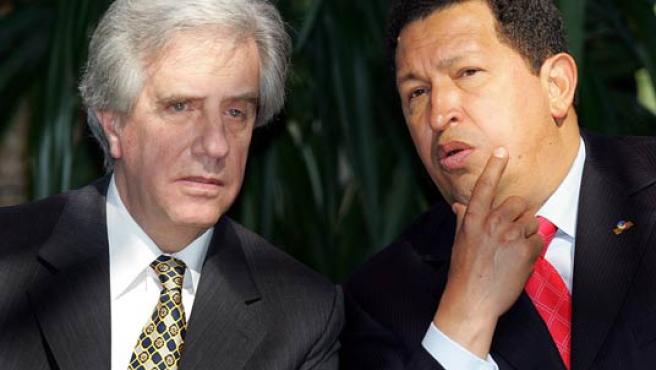By Hernán Yanes, correspondent from Montevideo
In a brief visit to Montevideo, Venezuelan President Hugo Chávez and
Tabaré Vázquez, President of Uruguay, managed to arrive at some
agreements that benefit both governments.
Chávez got the commitment from Uruguay to support and actively manage
Venezuela’s entry into Mercosur*, while the Frente Amplio (FA) [“broad
front”] government got some investments, energy cooperation agreements
(the real level of implementation of these agreements remains to be
seen) and some help from Venezuela in providing healthcare. But,
especially on the political level, the visit meant the Uruguayan
government could show the support it gets from the Venezuelan
government, which permits the Uruguayan government to conceal and make
up the right-wing policy that it has carried out since taking power.
The brief and restrained speech by Tabaré, 12 minutes in length,
contrasted with the hour and a half during which the verbose Chávez
displayed his rhetoric and anti-imperialist phraseology, as well as
his “socialist” stands.
For a government like that of Tabaré that welcomes the genocidal
killer Bush as a friend, sends troops to Haiti and follows the
dictates of imperialism, it is turns out to be inconvenient and
impossible even to denounce the US verbally; the mere presence of
Chávez in Uruguay permits that government to present a more “leftist”
discourse with which it tries to attract and contain the sectors of
the left and workers that see in Chávez an anti-imperialist and
popular policy.
That is, Tabaré is trying to disguise his submissive policy [towards imperialism] by appearing as a friend of Chávez, at a time that discontent and skepticism towards the Frente Amplio are increasing. The big rises in the price of food, the new tax on profits (that is really a tax on wages), or wages that have sunk, are creating malaise and anger among workers and the people.
At the same time, struggles that are going beyond the leaderships’
policy of conciliation and negotiation can be seen in some sectors, as
in the conflict at the biggest health insurance provider in Uruguay,
where its workers promoted and carried out measures of struggle in
defense of their wages, measures the leaders were unable to control.
Simultaneously, members of a housing cooperative society are
discussing a plan of struggle that includes a campaign of occupying
lands for the building of housing and for agricultural production,
while high school students are organizing and fighting for the right
to join a union.
Meanwhile, the pro-government bureaucracy that runs the trade union
federation (PIT-CNT) proposed a partial strike that it had announced
for Thursday, August 9, against the new tax, postponing it until the
end of the month, thereby rejecting a real plan for struggle against
this economic policy.
In this context, the presence of the Venezuelan President was
applauded and greeted enthusiastically by sectors of the “radical”
left. Sadly, these sectors support the politics of Chávez, consistent
with keeping an anti-imperialist rhetoric for “21st century
socialism,” (even though the rhetoric is more and more diluted), while
Chávez guarantees the continuity of the big deals that multinational
corporations like Repsol, Petrobrás or Techint, Botnia or Ense are
making, at the cost of hunger for our peoples and the plunder of our
resources. Chávez’ insistence on entering a Mercosur custom-made for
the big national and foreign capitals, is one more sign of the true
character of his fervor for Latin America. This is how the “radical”
left refuses to raise a politics of class independence [workers’
independence from the bourgeoisie] with a truly working-class and
popular plan to respond to the most urgent problems of the poor and
hard-working nation [of Uruguay], an alternative to every bourgeois
[political] variant, whether openly neo-liberal or “national and
popular.”
Translation by Yosef M.
========
[*”Mercosur or Mercosul (Spanish: Mercado Común del Sur) is a regional
trade agreement between Brazil, Argentina, Uruguay and Paraguay,
founded in 1991 by the Treaty of Asunción.” From en.wikipedia.org]











